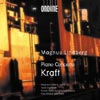Lindberg Piano Concerto
Early works from the Finnish composer are definitely signposts to the future
View record and artist detailsRecord and Artist Details
Composer or Director: Magnus Lindberg
Genre:
Orchestral
Label: Ondine
Magazine Review Date: 1/2005
Media Format: CD or Download
Media Runtime: 60
Mastering:
Stereo
DDD
Catalogue Number: ODE10172

Tracks:
| Composition | Artist Credit |
|---|---|
| Kraft |
Magnus Lindberg, Composer
Esa-Pekka Salonen, Conductor Finnish Radio Symphony Orchestra Magnus Lindberg, Composer Magnus Lindberg, Piano Toimii Ensemble |
| Concerto for Piano and Orchestra |
Magnus Lindberg, Composer
Esa-Pekka Salonen, Conductor Finnish Radio Symphony Orchestra Magnus Lindberg, Composer Magnus Lindberg, Piano |
Author: Arnold Whittall
The 2002 Sony Classical disc of music by Magnus Lindberg, including his Cello Concerto (1997-99, revised 2001), was one of the best contemporary music releases of that year (6/02). When Lindberg’s two more recent concertos – for clarinet, and for orchestra – appear on disc, as they surely will, evidence of his special interest in the genre will be powerfully reinforced. Meanwhile, this CD offers useful background in the shape of the Piano Concerto (1990-94), and a still earlier work, KRAFT (1985), which has distant links with the venerable tradition of the concerto grosso.
Both show signs that Lindberg was still feeling his way towards a satisfyingly personal musical style. In KRAFT, his early affinity with the post-1945 avant garde and its roots in, among others, Varèse, can still be heard. But despite the bravura of the confrontations it contrives between the orchestra (with electronics in attendance) and a team of clarinet, cello, piano and percussion soloists, the effect remains unashamedly earth-bound: sometimes dense to the point of congestion, other times highly fragmented, but not quite coming into focus in the way the more regular rhythmic patterns and rooted harmonic processes of the later works make possible.
Regularity and rootedness are beginning to emerge in the three-movement piano concerto, bringing with them the kind of engaging but not especially distinctive surface elaborations that only the best of Lindberg’s later works manage to turn to good account. At nearly 30 minutes, the concerto has its moments of routine, but these come earlier rather than later, and from the middle of the second movement the music builds an absorbing and exciting soundscape, broadening out in ways which announce one of Lindberg’s most productive affinities – with his great Finnish precursor Sibelius.
These performances are well characterised, even though the recording of KRAFT cannot fully reproduce the music’s sense of spatial movement. But Lindberg brings fine shades of colour and tone to bear on the generally forceful solo part of the piano concerto, and the recording is excellent.
Both show signs that Lindberg was still feeling his way towards a satisfyingly personal musical style. In KRAFT, his early affinity with the post-1945 avant garde and its roots in, among others, Varèse, can still be heard. But despite the bravura of the confrontations it contrives between the orchestra (with electronics in attendance) and a team of clarinet, cello, piano and percussion soloists, the effect remains unashamedly earth-bound: sometimes dense to the point of congestion, other times highly fragmented, but not quite coming into focus in the way the more regular rhythmic patterns and rooted harmonic processes of the later works make possible.
Regularity and rootedness are beginning to emerge in the three-movement piano concerto, bringing with them the kind of engaging but not especially distinctive surface elaborations that only the best of Lindberg’s later works manage to turn to good account. At nearly 30 minutes, the concerto has its moments of routine, but these come earlier rather than later, and from the middle of the second movement the music builds an absorbing and exciting soundscape, broadening out in ways which announce one of Lindberg’s most productive affinities – with his great Finnish precursor Sibelius.
These performances are well characterised, even though the recording of KRAFT cannot fully reproduce the music’s sense of spatial movement. But Lindberg brings fine shades of colour and tone to bear on the generally forceful solo part of the piano concerto, and the recording is excellent.
Discover the world's largest classical music catalogue with Presto Music.

Gramophone Digital Club
- Digital Edition
- Digital Archive
- Reviews Database
- Full website access
From £8.75 / month
Subscribe
Gramophone Full Club
- Print Edition
- Digital Edition
- Digital Archive
- Reviews Database
- Full website access
From £11.00 / month
Subscribe
If you are a library, university or other organisation that would be interested in an institutional subscription to Gramophone please click here for further information.




